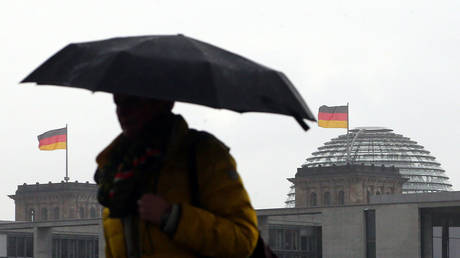Germany anticipates a third consecutive year of no growth – media reports
The government has reportedly reduced its GDP forecast as a response to the recent US tariff increase and ongoing uncertainty regarding Washington’s trade policy. According to Handelsblatt, Germany is facing its third consecutive year of economic...

According to Handelsblatt, Germany is facing its third consecutive year of economic stagnation, an issue attributed to the latest US tariff hike and escalating uncertainty about trade policies from the US government.
Earlier this month, President Donald Trump enacted a 20% tariff on all EU goods and a 25% tariff on imports of steel, aluminum, and cars, citing an unfair trade imbalance. While Brussels prepared retaliatory tariffs of 25%, Trump chose to pause most new tariffs for 90 days to allow for negotiations. Nonetheless, a baseline tariff of 10% and the targeted 25% tariffs remain effective.
The report indicates that Chancellor Olaf Scholz’s outgoing government has lowered its GDP forecast for Germany for 2025 to 0%, down from the previous estimate of 0.3% made in January. This marks a historic moment, as it would be the first time that the EU's largest economy does not grow for three straight years, following contractions in 2023 and 2024. A modest rebound is expected in 2026, with growth now anticipated to be 0.9%, slightly reduced from an earlier forecast of 1.1%.
Data from the Federal Statistical Office highlights that the US was Germany's top trading partner last year, making the potential impact of tariffs particularly crucial.
Uncertainty surrounding the tariffs has led German companies to postpone investments until the situation clarifies, contributing to the revisions in growth projections. If the full 20% tariffs are enacted, sources warn that growth could further decline. The Kiel Institute for the World Economy and Munich’s Ifo Institute previously estimated that the German economy could contract by 0.3% under such circumstances.
Business underperformance has contributed to the overall economic pessimism; however, some alleviation may occur due to the government’s recent establishment of a €500 billion infrastructure fund and reforms to the debt brake. The upcoming change in leadership could also provide relief, sources noted. Incoming Chancellor Friedrich Merz, who is expected to take office in May, has committed to enhancing the nation's economic competitiveness.
According to Handelsblatt, the figures may change based on Trump’s upcoming decisions and the results of discussions between Brussels and Washington.
European Commission President Ursula von der Leyen previously suggested a "zero-for-zero" tariff arrangement on industrial goods between the EU and the US, but Trump deemed it inadequate, demanding that the EU commit to purchase $350 billion worth of American energy in return for tariff relief.
At a recent meeting with Italian Prime Minister Giorgia Meloni, Trump mentioned that a deal between the EU and the US would “100 percent” be reached “at a certain point,” while expressing that he is “in no rush” to finalize it.
This report aligns with a recent downgrade from the IMF, which has also revised Germany’s 2025 growth outlook to 0.0%. The IMF predicts that Germany will be the only G7 economy to experience stagnation this year, given that its export-driven industries are particularly exposed to ongoing global trade tensions.
Camille Lefevre for TROIB News
Find more stories on Business, Economy and Finance in TROIB business












